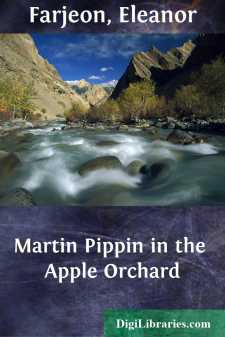Categories
- Antiques & Collectibles 13
- Architecture 36
- Art 48
- Bibles 22
- Biography & Autobiography 813
- Body, Mind & Spirit 142
- Business & Economics 28
- Children's Books 17
- Children's Fiction 14
- Computers 4
- Cooking 94
- Crafts & Hobbies 4
- Drama 346
- Education 46
- Family & Relationships 57
- Fiction 11829
- Games 19
- Gardening 17
- Health & Fitness 34
- History 1377
- House & Home 1
- Humor 147
- Juvenile Fiction 1873
- Juvenile Nonfiction 202
- Language Arts & Disciplines 88
- Law 16
- Literary Collections 686
- Literary Criticism 179
- Mathematics 13
- Medical 41
- Music 40
- Nature 179
- Non-Classifiable 1768
- Performing Arts 7
- Periodicals 1453
- Philosophy 64
- Photography 2
- Poetry 896
- Political Science 203
- Psychology 42
- Reference 154
- Religion 513
- Science 126
- Self-Help 84
- Social Science 81
- Sports & Recreation 34
- Study Aids 3
- Technology & Engineering 59
- Transportation 23
- Travel 463
- True Crime 29
Martin Pippin in the Apple Orchard
by: Eleanor Farjeon
Categories:
Description:
Excerpt
INTRODUCTION
In Adversane in Sussex they still sing the song of The Spring-Green Lady; any fine evening, in the streets or in the meadows, you may come upon a band of children playing the old game that is their heritage, though few of them know its origin, or even that it had one. It is to them as the daisies in the grass and the stars in the sky. Of these things, and such as these, they ask no questions. But there you will still find one child who takes the part of the Emperor's Daughter, and another who is the Wandering Singer, and the remaining group (there should be no more than six in it) becomes the Spring-Green Lady, the Rose-White Lady, the Apple-Gold Lady, of the three parts of the game. Often there are more than six in the group, for the true number of the damsels who guarded their fellow in her prison is as forgotten as their names: Joscelyn, Jane and Jennifer, Jessica, Joyce and Joan. Forgotten, too, the name of Gillian, the lovely captive. And the Wandering Singer is to them but the Wandering Singer, not Martin Pippin the Minstrel. Worse and worse, he is even presumed to be the captive's sweetheart, who wheedles the flower, the ring, and the prison-key out of the strict virgins for his own purposes, and flies with her at last in his shallop across the sea, to live with her happily ever after. But this is a fallacy. Martin Pippin never wheedled anything out of anybody for his own purposes—in fact, he had none of his own. On this adventure he was about the business of young Robin Rue. There are further discrepancies; for the Emperor's Daughter was not an emperor's daughter, but a farmer's; nor was the Sea the sea, but a duckpond; nor—
But let us begin with the children's version, as they sing and dance it on summer days and evenings in Adversane.
THE SINGING-GAME OF "THE SPRING-GREEN LADY"
(The Emperor's Daughter sits weeping in her Tower. Around her, with their backs to her, stand six maids in a ring, with joined hands. They are in green dresses. The Wandering Singer approaches them with his lute.)
THE WANDERING SINGER
Lady, lady, my spring-green lady,
May I come into your orchard, lady?
For the leaf is now on the apple-bough
And the sun is high and the lawn is shady,
Lady, lady,
My fair lady!
O my spring-green lady!
THE LADIES
You may not come into our orchard, singer,
Because we must guard the Emperor's Daughter
Who hides in her hair at the windows there
With her thoughts a thousand leagues over the water,
Singer, singer,
Wandering singer,
O my honey-sweet singer!
THE WANDERING SINGER
Lady, lady, my spring-green lady,
But will you not hear an Alba, lady?
I'll play for you now neath the apple-bough
And you shall dance on the lawn so shady,
Lady, lady,
My fair lady,
O my spring-green lady!
THE LADIES
O if you play us an Alba, singer,
How can that harm the Emperor's Daughter?
No word would she say though we danced all day,
With her thoughts a thousand leagues over the water,
Singer, singer,
Wandering singer,
O my honey-sweet singer...!


